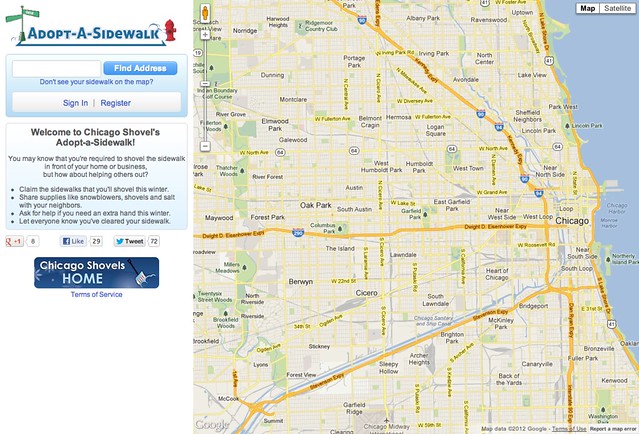 Next week, Smart Chicago will be at the Code for America Summit in San Francisco. We’re big fans and supporters of Code for America and we’re excited to take part in the summit. Dan O’Neil is one of the featured speakers at the event and Christopher Whitaker will be assisting with the Code for America Brigade training day. Continue reading
Next week, Smart Chicago will be at the Code for America Summit in San Francisco. We’re big fans and supporters of Code for America and we’re excited to take part in the summit. Dan O’Neil is one of the featured speakers at the event and Christopher Whitaker will be assisting with the Code for America Brigade training day. Continue reading
Code for America
Moving Forward After National Day of Civic Hacking
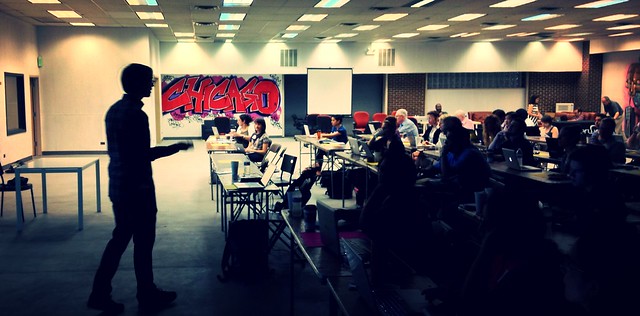
National Day of Civic Hacking is over. It was a great event that brought web developers, journalists, designers, community activists, data gurus, and government officials together for a weekend civic hacking. Chicago was the most active city with 412 people taking part in events at Cibola, 1871, and the Adler Planetarium.
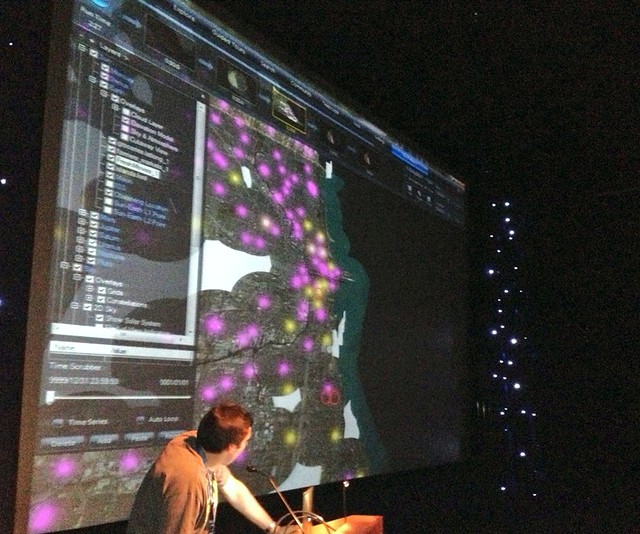
As a city, we should be proud of what’s we’ve accomplished. And not just for what happened during National Day of Civic Hacking, but proud of how far we’ve come since the days where the data portal only showed FOIA requests. We should celebrate these wins and in the coming days, we’ll be featuring these successes on the blog.
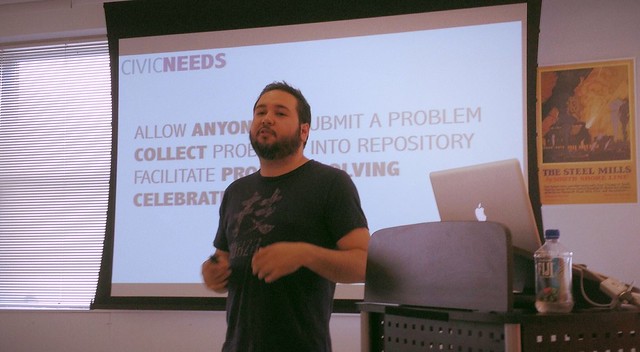
However, it’s far more important to ensure that these efforts continue past this weekend. Civic issues are complicated, complex, and difficult to solve. It will take more than a single weekend to find solutions to these problems. As a community, we need to continue to connect civic technologists to community activists who are wrestling with civic issues on a daily basis. We must continue to outreach to every neighborhood in Chicago and ensure that the apps we build help the everyday Chicagoan and not just the geeks. While this weekend has been a fantastic weekend to organize around civic innovation there is still a lot of work to be done.
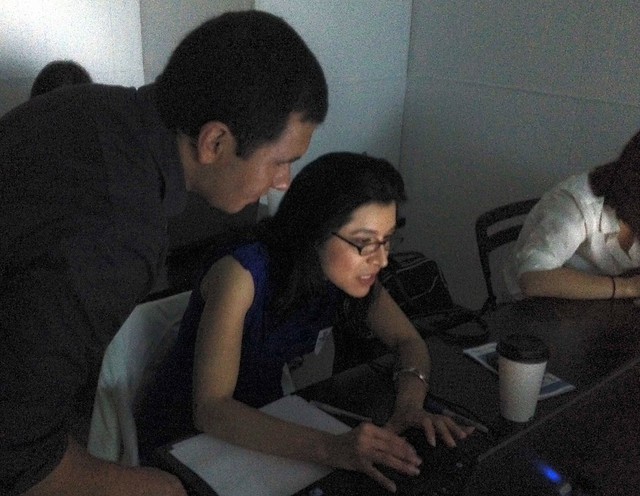
We met a lot of people over the weekend: Journalists, scientists, community organizers, web developers and designers. We need to connect the dots and form new partnerships to help solve problems in our neighborhoods. We would love to stay in touch with everyone who participated in National Day of Civic Hacking. If that sounds good to you, please fill out this quick contact form so we can reach out to you about different projects.
On our end, the Smart Chicago Collaborative is offering the following to any and all participants of Chicago’s National Day of Civic Hacking.
1) We encourage everyone to continue their projects at the OpenGovChicago Hack Nights. They’e every Tuesday at 6:00pm inside 1871. The events are free and these nights are a great way to work on long term projects.
2) If you have a civic app that benefits the people of Chicago, you can get the app hosted on Smart Chicago Collaborative’s servers for free.
3) Smart Chicago will provide user testing to any Chicago civic app for free. Through the Civic User Testing Group, civic developers in Chicago have access to hundreds of testers to help test your app in order to improve it and make the best app possible.
4) We will help you tell your story. At the national level, the organizers are accepting submissions for stories about what came out of National Day of Civic Hacking. Teams with the best stories will be invited to The White House to be featured at an event in late July. If you need help writing your story, email cwhitaker(at) cct (dot) org and we’ll help you get your story ready. We’ll also help put together a short video to include with your submission.

It’s an exciting time to be involved in this movement. There are more and more cities getting involved in civic hacking thanks to the efforts of the Code for America brigade and through events like National Day of Civic Hacking. We’re looking forward to continuing this effort in the future.
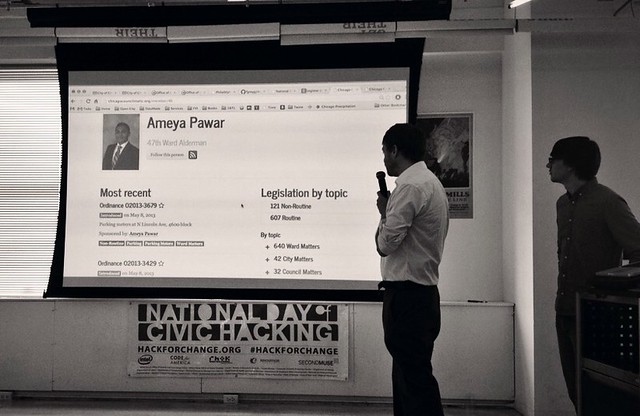
Thank You
Smart Chicago Collaborative would like to thank all those that made this weekend possible:
Event locations: 1871, Cibola, and the Adler Planetarium.
Lead Organizations: Institute for Justice Journalism, The Adler Planetarium, and Code for America.
Event Sponsors and Partners: Azavea, Center for Evidence-Based Mentoring, Chicago Architecture Foundation, The Chicago Community Trust, the City of Chicago, Free Spirit Media, Hive Chicago, Knight Lab, The MacArthur Foundation, Mikva Challenge, Rob Paral, and Open City Apps
Improving Adopt-a-sidewalk
TL;DR: Adopt-a-sidewalk is a flawed, under-utilized application with enormous potential. By refocusing the user experience on addressing actual needs of people in Chicago and showing meaningful activity, it could be a powerful tool for engaging citizens in supporting and improving the civic infrastructure in their community.
Winter is officially in Chicago’s rearview mirror, although you would not notice from the chilly temperatures outside. This post is a reflection on one of Chicago’s winter-weather civic applications, Adopt-a-sidewalk, an application I helped bring online over a year ago, and how it can evolve to improve the lives of Chicago residents year-round.
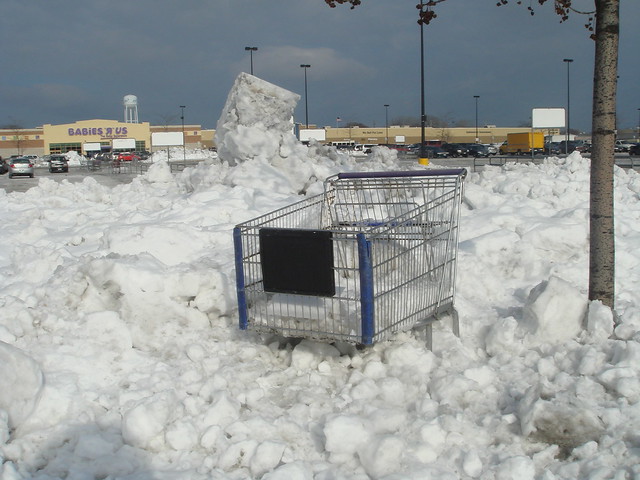
Adopt-a-sidewalk is a Chicago-based version of the Adopt-a-hydrant web application built by Code for America in Boston back in 2011. Developed by Code for America fellow Erik Michaels-Ober, Adopt-a-hydrant lets residents of Boston volunteer to clear fire hydrants when there is a snow storm.
In the fall of 2011, City of Chicago officials, acutely aware of the severity and importance of swift snow removal, saw an opportunity to repurpose the code, and invited a group of civic developers to customize the application for use in Chicago. The key functional difference between the applications is that in Chicago, residents can request help clearing their sidewalk. Adopt-a-sidewalk first went live as part of ChicagoShovels.org in January 2012, and generated a bit of fanfare in local and national media:
- New York Times: Snow Site Lets Chicago See if Plows Are Really in a Rut
- ABC7 News: Mayor’s office launches ChicagoShovels.org
- Chicagoist: City’s Adopt-A-Sidewalk Website Launches
Adopt-a-sidewalk saw moderate adoption, but quickly fell out of use due to a very mild winter, and the fast arrival of spring a few months later. In the fall of 2012, the City of Chicago asked the Smart Chicago Collaborative to assume the responsibility of hosting the application, and development responsibilities were handed over to the Code for America Chicago brigade.
To date, Adopt-a-sidewalk has seen very little adoption in Chicago. There are 557,793 individual sidewalk segments available for adoption, but only 75 registered users. 153 sidewalks have been claimed, either by volunteer shovelers, or people asking for help. That means that only 0.027% of all sidewalk segments in Chicago have been adopted. At its busiest, only 200 people visited the site in a given day.
There are three major issues that impact the usability and adoption of Adopt-a-sidewalk.
First, plainly speaking, the application is boring. In the case of a snow storm, there is a sense of urgency to responding and cleaning up the mess. The City deploys a fleet of snowplows to clear the streets, and neighborhoods are abuzz with residents scraping cars, shoveling steps, and snow-blowing their sidewalks and alleys. On Adopt-a-sidewalk, there is absolutely no perception of activity, urgency, or community. There is no mechanism to show users where activity is happening, or if there is a need for activity. On their first visit to the site, users are presented with a featureless, generic Google map of the city of Chicago, and no clear call to action. If the user does decide to register and adopt a sidewalk, there is little incentive to return or to refer friends to the site.
Second, the path to participating is laden with friction. Users must search using a real Chicago street address and register for an account before they may participate. Registering an account involves giving a name, email address, a password, and completing a captcha. There’s no mechanism to invite your neighbors to join you in shoveling, nor is there a mechanism to share your activity with your social network.
Third, the application is useless when there is no snow on the ground. Adopt-a-sidewalk is irrelevant in the summertime, and, for most of the winter spent between snow storms. There is no incentive to return to the site, and there is no meaningful action to take in between snow storms.
On a conceptual level, the premise of Adopt-a-sidewalk is flawed. Chicago residents are already expected to and, by ordinance, required to, shovel their sidewalks. Adopt-a-sidewalk provides no benefit to users who adopt the sidewalk in front of their house and dutifully shovel it each time snow falls. The steps to register and adopt their sidewalk is busy work.
The real work
Instead of asking users to do monotonous work, Adopt-a-sidewalk should focus on providing a real service: matching people in need of help with people willing to help. In that scenario, there are two key classes of users: people who cannot clear their sidewalks and people who are willing to help shovel sidewalks near them.
By shifting the interaction model from navigating a half million rectangles on a map to a focused, needs-based one, many of the core usability issues can be alleviated. It’s far easier to show activity, in the form of the most recent or most urgent requests for help, and the reward for participating is much more immediate and meaningful. Instead of highlighting what’s expected of people, the focus can be on enabling and rewarding people who want to help their neighbors.
The natural extension of this concept is to move beyond simple sidewalks and instead enable neighborhood adoption of any civic infrastructure. Adopting sidewalks could easily gave way in the spring and summer time to adopting parks and community gardens. In the fall, communities could band together to adopt a local school and fix it up before students return. A baseball team can adopt its ball field and organize events to maintain and improve it.
Fostering community around shared civic infrastructure is not a new concept. However, using technology, it is possible to integrate the real world thing with an online community, and the vast network of people and data that exists there. With the rise of open government data, not only is the civic infrastructure as physical object or place, it’s a continuous stream of data and interactions. The baseball diamond around the corner is not just a sandlot for shagging fly balls, it is a collection of data points: tweets, photos, and events created by community members, and crime reports, 311 requests, park facilities data from the local government.
I look forward to seeing where Adopt-a-sidewalk goes from here, especially if Code for America or one of the brigades takes some of the concepts from Adopt-a-sidewalk and pulls them back into the mainline repository. Adopt-a-sidewalk is, despite its flaws and low adoption, one very small step on a long path to building, enabling, and merging real life and online communities.
ClearStreets: Another Great Project Benefitting from Space on the Smart Chicago EC2 Account
As we noted in the launch post about Adopt-A-Sidewalk, tonight marks the first storm here in Chicago this winter. That means it is the first time this season that snowplows have been deployed by the Chicago Department of Streets and Sanitation. Here’s a list of all the 669 employees in that department with the word “driver” in their job title:
Drivers in Streets + San
These are the people doing the essential work that keeps our city safe and operating smoothly. They deserve a lot of credit.
So plows on the street mean the City’s PlowTracker is in action, showing the plows in real time:

New this year– works in mobile!

And PlowTracker up and running means that ClearStreets has data to show you where the plows have been:

Yesterday the people behind ClearStreets, including Derek Eder, who works as a contractor for a number of map-focused Smart Chicago projects, including Chicago Health Atlas, Chicago Early Learning (along with Azavea out of Philly), and Connect Chicago, needed a place to run some scripts that help ClearStreets run. They’re using civic data, are helping make lives better, and otherwise meet our criteria for inclusion in our free hosting program, so they’re up and running on our account.
We host a number of other projects there, including Twitter classification experiments that track illness and learning management systems that store free digital training. We’ve got 17 instances with our own projects and those from the larger OpenGov community in Chicago.
This is where Smart Chicago sits— founded by the municipal government and some of the City’s largest philanthropic institutions, directly funding civic developers to work on important projects, hosting gatherings where developers get together to talk policy and write code, providing real (through our seats at 1871) and virtual space for innovation.
Let it snow.
Adopt-A-Sidewalk is Re-Launched Along With Mayor Emanuel’s Chicago Shovels Program (Just in Time!)
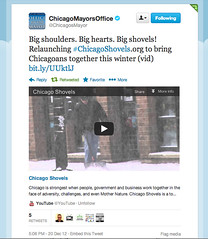
The Smart Chicago Collaborative is proud be a part of Chicago Shovels, Mayor Rahm Emanuel’s initiative to help connect the public with City winter resources and empower neighbors to come together to help Chicago navigate winter. We worked with the City of Chicago and the Chicago Code for America Brigade to re-launch of Adopt-A-Sidewalk.
As part of the Race for Reuse Campaign at Code for America, local civic hackers helped to move the City of Chicago’s Adopt-A-Sidewalk app onto servers hosted by the Smart Chicago Collaborative, document the code, and publish it as a fresh instance to Github. This means that developers can continue to improve the site by adding new features and continuing to integrate additional data sets as the city expands on its data offerings.
The Race for Reuse is a nationwide effort to help redeploy civic apps all across the country with 28 cities helping to deploy 31 civic apps. Adopt-A-Sidewalk was originally built as the Boston-focused Adopt-a-Hydrant app that lets citizens adopt hydrants that they agree to take care of in the event of snow.
Chicago has modified this code and added map files of every sidewalk in the city. Residents can claim sidewalks during snow events (like tonight!)– pledging to shovel their own walks or take care of a neighbor’s 25 feet of love. If you can’t shovel your walk and need help, The app will also let people indicate that they need help with their sidewalk. Volunteers can then go into the app and adopt that particular sidewalk.

Lots of people worked on this app. Chief among them is Ryan Briones. He is an IT Director for Software Architecture and Design at the City’s Department of Innovation and Technology, but he worked to configure the server and document the code on his evenings, civic hacker-style. He is longtime member of OpenGovChicago and just flat-out cares about this stuff.
Christopher Whittaker, the Code for America Brigade Captain here in Chicago, shepherded the entire process and did a goodly amount of tweaking as well. He is a tireless organizer and he’s been a a continued link to the key national Code for America organization, from which all of this sprung.
When Adopt A Sidewalk launched last February, it was set up mainly by a group of dedicated team centered around the Obama for America tech team. This included Scott VanDenPlas, Aaron Salmon, Arun Sivashankaran, Ben Hagen, Chris Gansen, Jason Kunesh, Jesse Kriss, Nick Leeper, Ryan Kolak, Paul Smith, and Scott Robbin.
This time around, Michael Barrientos and Emily Rosengren worked to get us to launch. Derek Eder gave some advice, Rebecca Ackerman enabled zoom, and Joe Olson of Tracklytics helped with DNS configuration.
Chicago is no stranger to community technology for the wintry mix. In 2011, a great group of people emanating from the Chicago Tribune news apps team that created and worked the ChicagoSnow Crowdmap (Ask for help, lend a hand: Blizzard 2011). We spent a couple nights managing and mapping 984 snow help reports for the blizzard of February 1, 2011. Here’s a super-detailed writeup. It was a great test case in community building around a weather event.
People interested in civic hacking are encouraged to meet to talk policy, data, and technology at the OpenGovChicago meetup group. You can also head over to the Open Gov Hack Nights at 1871 located inside the Merchandise Mart. These growing gatherings, hosted and supported in part by Smart Chicago, are a great way to get a mitt and get in the game on civic hacking.
Here’s a video explaining the program:
Help Improve Adopt-A-Sidewalk
 In February of 2011, a massive blizzard hit the City of Chicago effectively shutting the city down for a day and a half. Lake Shore Drive, Metra lines, and business closed down as the city was buried under 20 inches of snow.
In February of 2011, a massive blizzard hit the City of Chicago effectively shutting the city down for a day and a half. Lake Shore Drive, Metra lines, and business closed down as the city was buried under 20 inches of snow.
In the storm’s aftermath, Chicago cleaned itself up with neighbors helping neighbors shovel out the snow. In that same spirit of being good neighbors, Chicago is joining Race for Reuse to push adoption of the Adopt-A-Sidewalk app.
Adopt-A-Sidewalk is Chicago’s implementation of the Adopt-A-Hydrant application. Users adopt a sidewalk that they agree to shovel after a snow event. Through the site, you can also share resources like snow blowers and salt as well as let people know that your sidewalk has been cleared. More importantly, those that need help clearing their sidewalk can do so through the app. This will let volunteers, who sign up through the city’s Snow Corps app, know which sidewalks also need to be cleared.
Through a partnership between the City of Chicago and Code for America and the Smart Chicago Collaborative, the Adopt-A-Sidewalk app is getting overhauled for the new winter season. The app has been open sourced on GitHub and civic hackers are invited to help improve the app. The app will be hosted on the Smart Chicago Collaborative AWS account in order to make it easier to implement improvements to the Adopt-A-Sidewalk code.
Christopher Whittaker ([email protected]), the Code for America Brigade leader here in Chicago, is leading this effort. Civic hackers interested in working on Adopt-A-Sidewalk are invited to come to the OpenGov Hacknights Tuesdays at 6:00pm inside 1871. There we’ll discuss needed improvements and enhancements to the app.
